Often you will come across mixed ideas when asking people the difference between a DJ (Disk Jockey) and a music producer. For a musician (but not all of them), it’s not hard to understand what role each of these professions plays in music.
But to someone that knows nothing about music, you may get a little confused, especially when you learn that there is more than one kind of music producer as well.
A producer uses software and analog equipment to layer sounds and instruments over top of each other to create music (and some of them go on to develop the work of other artists). A DJ is a live performer who mixes pre-made music together to play for people at clubs, parties, and other gatherings.
Each profession requires knowing some basics about music. However, both can bleed into each other professionally. A DJ can be a producer, and a producer can be a DJ, but often one specializes in one set of skills over the other. In fact, it’s very common for DJs to be music producers as well, although, not all of them actually create their own tracks. Let’s talk about each one to really explain the differences.
There Are Many Types of Producers
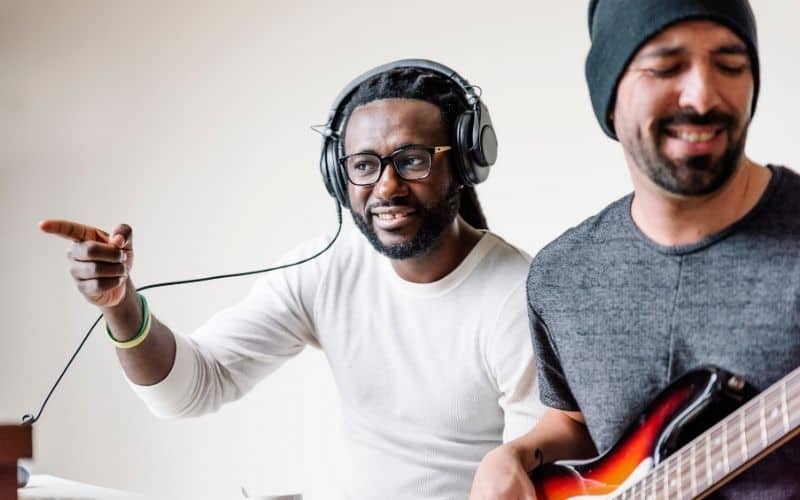
The type of producer can be misunderstood because there are two different types of producers. They both need to know timing, EQ, compression, and other engineering tools, and they typically how to run industry-standard music software, but both are different from each other in the way they work with other artists.
Both types of music producers often learn about music theory and develop a strong sense of harmony. They understand how elements like rhythm, melody, lyrics, songwriting, and song analysis work.
However, one producer is more commonly what a person would describe as a “bedroom producer” versus a “music producer.” More on this in a minute***.
Types Of Producers
Electronic Dance Music and Hip-Hop Producers
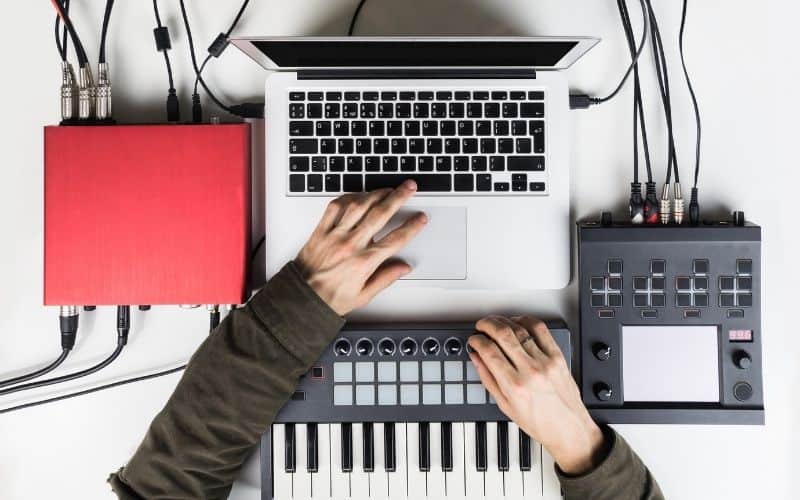
An Electronic Dance Music (EDM) or hip-hop producer creates music mostly from scratch in a studio. They typically work by themselves creating music, but there are no limits in working with other artists, of course.
A producer of this kind will either tweak samples found online or in their DAW to layer a sound that is their own (or someone else’s).
Technological advancements have made being an EDM or hip-hop producer more accessible by integrating software and computer technology as opposed to before, where musicians had to have a lot of analog equipment like synthesizers, keyboards, and more.
***This is the type of producer that people on social media refer to as a “bedroom producer,” because it’s not uncommon for beginner music producers to use a DAW, a MIDI keyboard, and some other equipment in their home (by the way, I have a whole article on what gear you need to get started).
The term “bedroom producer” is great for distinguishing between a music producer and a “bedroom producer,” because they’re not the same thing at all.
A 22-year-old kid who makes beats in their room is obviously quite a bit different from a traditional music producer, whose role is to actually develop a record with an artist. More on this in the next sub-section.
Producers That Work With Bands
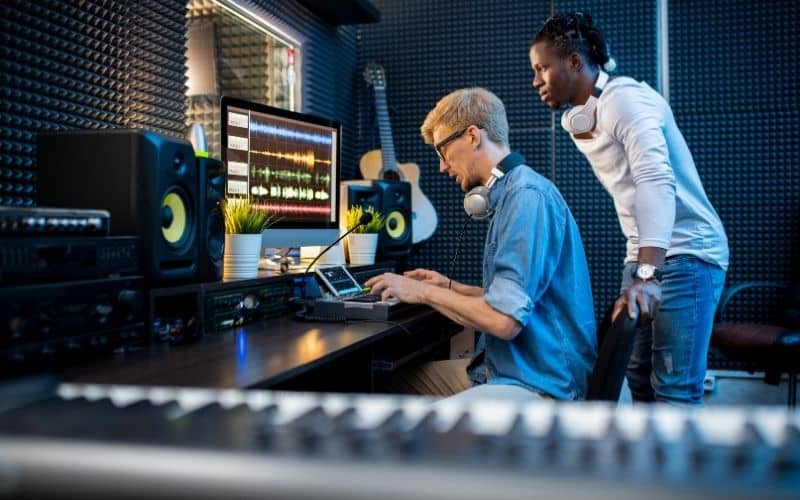
According to Rick Clark, who wrote the book, Mixing, Recording, and Producing Techniques of the Pros, an artist usually hires a producer to be an extra ear and provide creative input when recording.
They typically have a knack for capturing the moments of greatness that the artist is capable of and often bring out a deeper understanding of the songs being produced. A music producer can be hired to work in TV, media, advertising, and scoring for pictures.
Music producers that work with bands take on many aspects of the recordings they produce. A producer uses their extensive musical and technical experience to oversee all aspects of a recording session. It is essential for a producer to bring out the best in that band and their recordings.
Every popular song on the radio had a music producer that cared about that song and was able to help shape the final product. As for the differences between producers and DJs, the distinction is much bigger.
Really, the main difference between a producer and a DJ is that the producer makes the music whereas the DJ just plays it. We’ll talk more about this here.
What Are DJs?
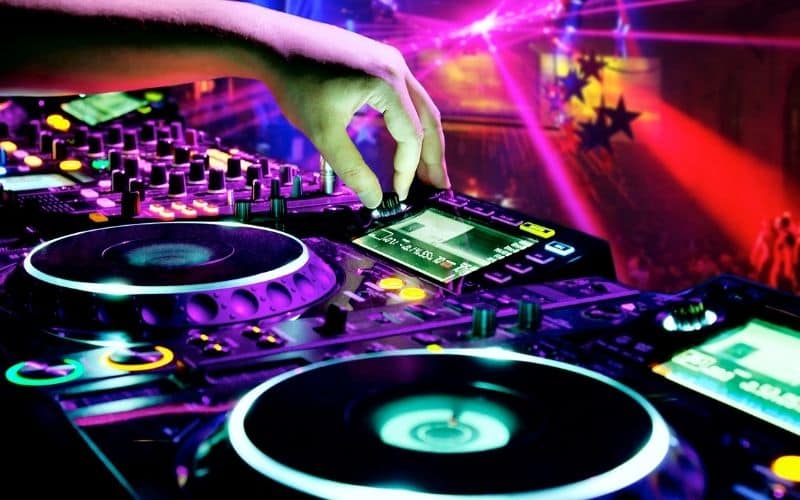
A quote from Frank Broughton and Bill Brewster’s book, How to DJ Right, talks about what is, essentially, the sole purpose of a DJ. So what is it?
It’s to understand other people and learn about their tastes. I’m paraphrasing what they wrote, but the long and short of it is that DJs are supposed to learn what other people like; their feelings, what makes them smile, laugh, and dance; and then they use this information to inform their decisions on what music they should play.
A DJ is usually a hired professional that is for entertainment purposes. A DJ condenses the work and talent of hundreds of musicians into a single concentrated performance by playing songs that are specifically curated for a certain kind of event. They are typically hired by a bar, nightclub, or a party organizer to keep the music playing for their guests.
To prepare for a DJ gig, in addition to owning the proper equipment like turntable and a powerful enough laptop like this MacBook, there is a lot of searching and careful planning involved.
It’s crucial to think of what songs will be suited for the event and the people attending. A good, in-demand, DJ understands the importance of knowing their audience, what they like, what songs make them dance, and what songs make them sad.
The skills demanded by this job are quite a bit different from a composer, for example, which I’ve talked about elsewhere on the site before.
Types of DJs
Club DJ

A club DJ needs to know how to mix tracks together and read a crowd. They make selections for the time and place on the spot. They focus on finding new music, finding music that goes well together, and technical skills that involve matching the speed of the tracks. A Club DJ needs to know how to mix songs in real-time.
When mixing two or more songs together, you are often changing the format of the song by using techniques such as looping, adding effects, cutting frequencies, and scratching.
Some of the best DJs are really just people who know how to get others dancing, moving, and having a good time, while others might be experts at scratching.
Event DJ
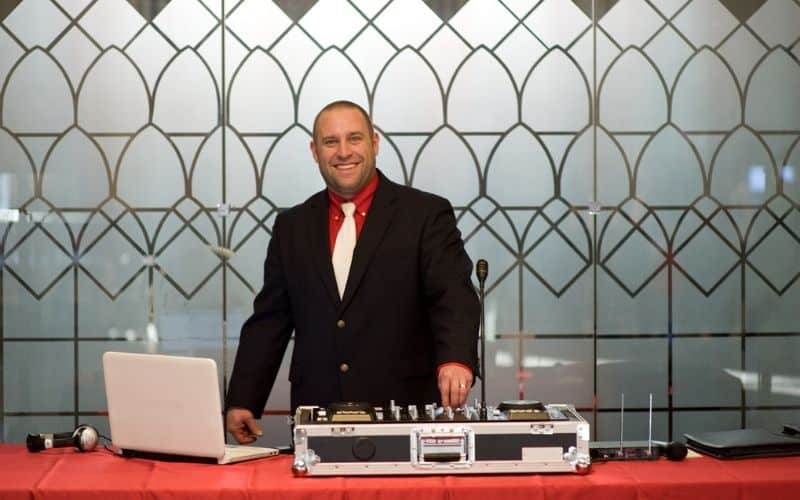
Weddings and corporate events often want a DJ to take care of the atmosphere of the event. The responsibility lies in the entertainment of the chosen DJ.
This DJ needs to know how to read a room and please the crowd and hype them up much like a club DJ, but events tend to be more intimate and require a DJ that can make the most out of that situation.
Radio DJ

According to Wikipedia, the official term Disc Jockey is tightly referenced with radio personalities because that’s where this profession started appearing in print in 1941 in Variety Magazine. It was used to describe radio personalities who introduce records on the air. We are all pretty familiar with this type of DJ.
A real skill to becoming a Radio DJ is knowing music very well. It takes years of knowing music, finding music, and understanding it to shape great sets for every type of radio station. Another skill they have to possess is the “Gift of Gab,” or knowing how to talk when talking into a microphone to a large, virtual audience.
Reasons Why People Often Misconstrue The Professions and Why They Are Invariably Different
Being a DJ Does Not Make You a Producer
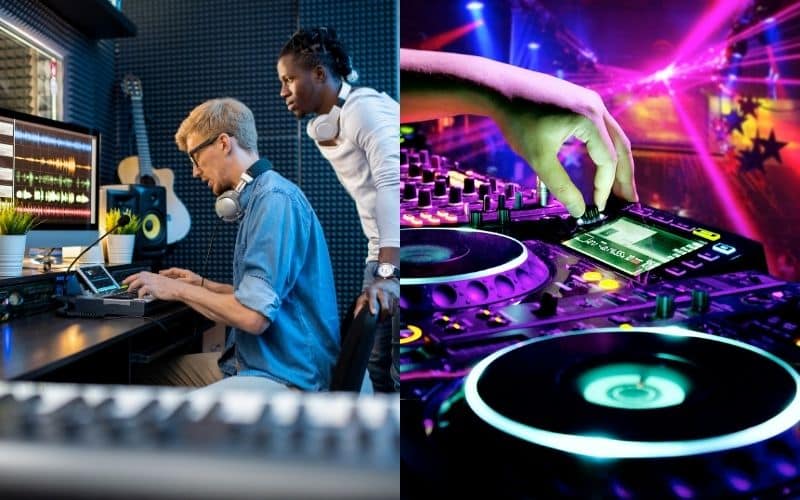
A big part of the confusion surrounding some of these terms has to do with the fact that many of these people play more than one role. For instance, some DJs, like Skrillex and Deadmouse, produce their music while other DJs just play other people’s music at parties/bars/clubs, etc.
There is obviously an art to both, and someone who is good at producing won’t necessarily be a good DJ, nor vice versa.
Additionally, some of the terms are used interchangeably even though they mean different things. For instance, what we talked about above, the difference between a music producer and a producer, or, the “bedroom producer” versus the “producer.” These are totally different things.
For instance, there is a difference between someone like Rick Rubin, a very famous record producer, and just some kid on his laptop in his bedroom.
Getting back to the point I just made above, being a DJ does not make you the producer of the song you play. That only happens when the DJ has produced the tracks for his live performance.
This profession calls for being more of an artist that knows what goes well together and presenting it in a way that helps keep the party alive. Often a producer plays multiple instruments and knows how to be a music engineer.
They have spent a lot of their life learning many aspects of music, kind of like a composer has to learn different instruments to lead a large symphony.
A DJ, on the other hand, often does not know much about playing an instrument but knows how to craft two songs together seamlessly, which takes a particular skill in its own right. Both require a set of skills that take years to develop, but the skills are incredibly different.
They Have Different Career Paths
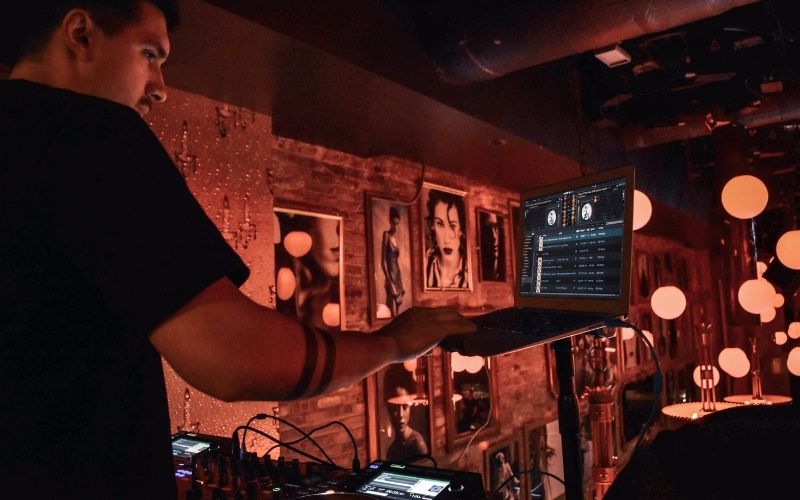
Both being a DJ or music producer can be very lucrative career paths, but being a DJ is usually associated with gig work that a person has to consistently seek out or establish a residency at a local bar or nightclub. Often, the more popular DJs tour as a way of gigging. This is quite a bit different from a producer.
A producer gets their work from referrals and other work they have done in a studio. Usually, a producer is hired by a musician, record label, or a studio to come into the studio to work with the artist and produce music in the way the artist wants.
Can A Producer Be A DJ or Vise Versa?
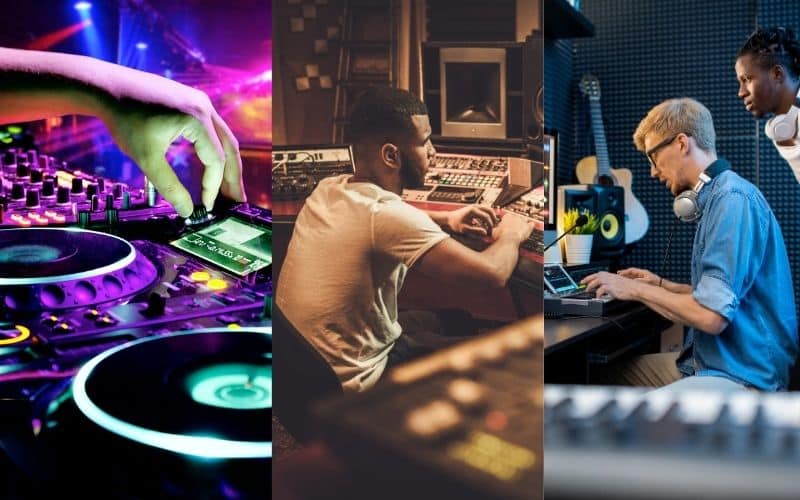
As I said before already, these professions require similar skills and can bleed into each other. Being a producer is different than being a DJ, but it can be done by the same person. It’s not uncommon to find DJs that do produce their own tracks. A DJ/Producer makes their own music so they can play it in front of an audience.
Many prominent DJs gained popularity by remixing other artist’s songs and releasing them for people to listen to. The popular songs made those artists famous. While it’s probably a good thing to be great at both producing music and DJing, one is not the prerequisite for the other.
A DJ at least has to have a basic understanding of how music works but doesn’t necessarily have to know how to run a recording session as a producer does.
A club DJ can be a producer if they are producing their own tracks to play at their DJ gig, but most likely, they are just combining tracks by way of a mixer and cd decks or turntables. DJing has and will continue to evolve with the hardware of music in general.
There are many differences between being a DJ and a producer, but you can acquire the skills to do both if you wanted to.
The most memorable DJs and producers know their craft well and present it in a way that captivates audiences, usually, the most famous ones do produce their own music, so it’s no wonder that so many people misinterpret one profession for the other.
Important Things to Note About Producers and Audio Engineers
1) A Producer Can Be an Audio Engineer – But They Don’t Have To Be
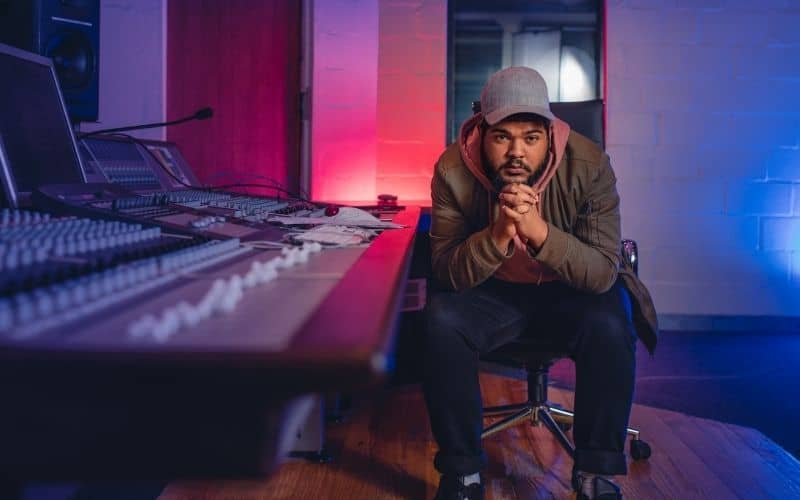
A producer can also but doesn’t necessarily have to be an audio engineer.
An audio engineer spends hours of their life learning how to record songs and make them sound stereo-worthy using Digital Audio Workstations (DAW). They often work closely with a producer to deliver outstanding audio recordings that the artist is happy with.
Being a music producer and an audio engineer is often associated with using software-based sequencing, advanced musical and rhythmic programming, digital audio editing, and musical content creation applications to record music.
With all that said, there is one thing that DJs and music producers have in common and that is that they both need to take care of their hearing, in fact, I’ve written a whole other article about this.
Other Articles You May Be Interested In
YouTube Video
References and Gear
1) Mixing, Recording, and Producing Techniques of the Pros by Rick Clark.
2) How to DJ Right: The Art and Science of Playing Records by Frank Broughton and Bill Brewster
3) Pioneer DJ DDJ-SB3 DJ Controller
4) Apple Macbook Pro 16″

 Written By :
Written By :